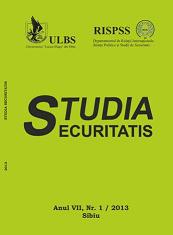INTERESUL NAŢIONAL ŞI RELAŢIILE ÎNTRE ROMÂNI ŞI EVREI ÎN PERIOADA 1940-1944, ÎN ISTORIOGRAFIA POST-DECEMBRISTĂ
NATIONAL INTEREST AND RELATIONS BETWEEN THE ROMANIANS AND JEWS DURING 1940-1944 IN POST-REVOLUTIONARY HISTORIOGRAPHY
Author(s): Florin StanSubject(s): Politics / Political Sciences
Published by: Editura Universitatii LUCIAN BLAGA din Sibiu
Keywords: Jews in Romania; the last World War; the Holocaust; historiographic debate
Summary/Abstract: The condition of the Jews in Romania during the last World War has become a centre for historiographic debate especially during the last post ’89 decade, when the opening of the approach of a direct research circumscribed to the unveiling of the “Jewish problem” was obvious, despite the continuation in following certain directions of subjective interpretation of the Antonescu regime by some of the contributions. If the contemporary history of any society is being studied with greater difficulty than any other period of the past, people being relatively close to the events and having a propensity toward partiality in judgments, this fact is easier verifiable when the subject is the otherness. Therefore, the classical principle of the study of history, sine ira et studio, is being inevitably tested in the case of contemporary period. However, history is only one. Beyond a given polemic within the domain, fertile for the research, this thing can be sometimes translated by dividing the community of historians into rival factions, which in some cases are difficult to be reconciled. The responsibility of the historian remains sovereign and increases once his disposition exceeds the interpretation of diplomatic confrontations or specific circumstances to the history of international relations, aiming to approach what the war really meant, an inferno for countless innocent people, children, women, elders, who were remote in relationship with the policy of the time. Since, crimes are unjustifiable regardless the circumstances, any approach that attempts to sustain the contrary, either within the broader context of generalized sufferance caused by the political-military confrontations, or subsequent to a simplistic interpretation of the cause-effect kind is depriving the historical writing of its equidistant contributions.
Journal: Studia Securitatis
- Issue Year: 2013
- Issue No: 1
- Page Range: 28-42
- Page Count: 15
- Language: Romanian
- Content File-PDF

